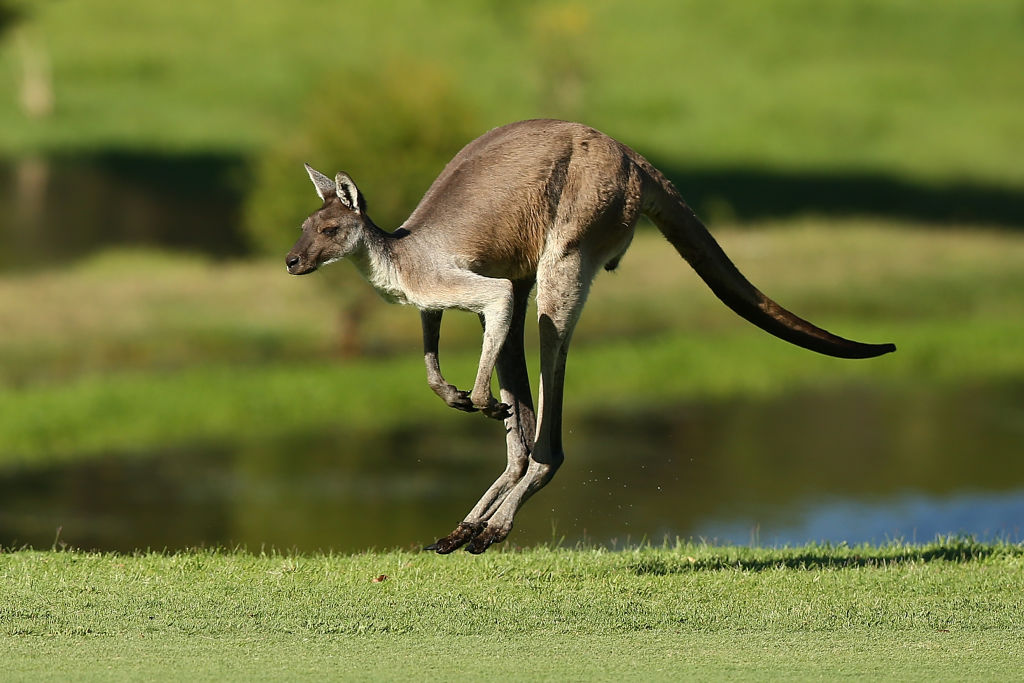Driverless car technology is being thwarted by kangaroos


Roughly 3.3 million years after ancient humanoids invented the earliest known tools, mankind is on the cusp of perfecting sophisticated self-driving technology that has the potential to revolutionize transportation as we know it.
There is only one problem: kangaroos.
Volvo's new self-driving technology uses a "large animal detection" system to prevent its S90 and XC90 car models from plowing into deer or moose while on the go, the BBC reports. But during tests in Australia, researchers realized the technology is completely befuddled by the hops of kangaroos.
The Week
Escape your echo chamber. Get the facts behind the news, plus analysis from multiple perspectives.

Sign up for The Week's Free Newsletters
From our morning news briefing to a weekly Good News Newsletter, get the best of The Week delivered directly to your inbox.
From our morning news briefing to a weekly Good News Newsletter, get the best of The Week delivered directly to your inbox.
"We've noticed with the kangaroo being in mid-flight when it's in the air, it actually looks like it's further away, then it lands and it looks closer," Volvo Australia's technical manager, David Pickett, told ABC.
To fix the problem, Volvo first needs to "start identifying the roo," Pickett explained. That would make sense, seeing as the company initially developed its large animal detection software by dodging moose in Sweden.
Determined, Volvo has spent the past 18 months in Australia teaching its software not to hit kangaroos. The company needs to get it exactly right, after all, as there are more than 16,000 roo collisions a year in the country, NRMA Insurance reports.
"We identify what a human looks like by how a human walks, because it's not only the one type of human — you've got short people, tall people, people wearing coats," Pickett explained. "The same applies to a roo."
A free daily email with the biggest news stories of the day – and the best features from TheWeek.com
Jeva Lange was the executive editor at TheWeek.com. She formerly served as The Week's deputy editor and culture critic. She is also a contributor to Screen Slate, and her writing has appeared in The New York Daily News, The Awl, Vice, and Gothamist, among other publications. Jeva lives in New York City. Follow her on Twitter.
-
 Does standing up to Trump help world leaders back at home?
Does standing up to Trump help world leaders back at home?Today’s Big Question Mark Carney’s approval ratings have ‘soared to new highs’ following his Davos speech but other world leaders may not benefit in the same way
-
 Will AI kill the smartphone?
Will AI kill the smartphone?In The Spotlight OpenAI and Meta want to unseat the ‘Lennon and McCartney’ of the gadget era
-
 Must-see bookshops around the UK
Must-see bookshops around the UKThe Week Recommends Lose yourself in beautiful surroundings, whiling away the hours looking for a good book
-
 TikTok secures deal to remain in US
TikTok secures deal to remain in USSpeed Read ByteDance will form a US version of the popular video-sharing platform
-
 Unemployment rate ticks up amid fall job losses
Unemployment rate ticks up amid fall job lossesSpeed Read Data released by the Commerce Department indicates ‘one of the weakest American labor markets in years’
-
 US mints final penny after 232-year run
US mints final penny after 232-year runSpeed Read Production of the one-cent coin has ended
-
 Warner Bros. explores sale amid Paramount bids
Warner Bros. explores sale amid Paramount bidsSpeed Read The media giant, home to HBO and DC Studios, has received interest from multiple buying parties
-
 Gold tops $4K per ounce, signaling financial unease
Gold tops $4K per ounce, signaling financial uneaseSpeed Read Investors are worried about President Donald Trump’s trade war
-
 Electronic Arts to go private in record $55B deal
Electronic Arts to go private in record $55B dealspeed read The video game giant is behind ‘The Sims’ and ‘Madden NFL’
-
 New York court tosses Trump's $500M fraud fine
New York court tosses Trump's $500M fraud fineSpeed Read A divided appeals court threw out a hefty penalty against President Trump for fraudulently inflating his wealth
-
 Trump said to seek government stake in Intel
Trump said to seek government stake in IntelSpeed Read The president and Intel CEO Lip-Bu Tan reportedly discussed the proposal at a recent meeting
